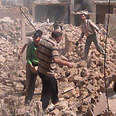
Russia on Saturday blocked a UN Security Council declaration of alarm over the bloody siege of the Syrian town of Qusair by Syrian troops and Hezbollah guerrillas, Security Council diplomats said.
Britain, president of the 15-nation council, had circulated a draft statement to fellow members voicing "grave concern about the situation in Qusair, Syria, and in particular the impact on civilians of the ongoing fighting."
Related stories:
- Rebels against Hezbollah: Rockets hit Baalbek region
- Family: US mother killed in Syria kept many secrets
- Russia to sell at least 10 MiG fighters to Syria
Qusair, near the Syrian-Lebanese border, is usually home to an estimated 30,000 people. Fighting for control of the town has raged for two weeks.
Council statements must be agreed unanimously. Russia blocked the draft text, saying it was "not advisable to speak out as the UN Security Council didn't when Qusair was taken by the opposition," a council diplomat said on condition of anonymity.
Another diplomat confirmed the remarks.
Moscow's move to block the statement highlights the deep chasm between Russia and Western nations on how to deal with the two-year-old civil war in Syria that has killed more than 80,000 people. Russian diplomats in New York did not respond immediately to a request for comment.
Diplomats said Russia told council members that the best way to deal with Syria was through intensive diplomacy. However, one council diplomat noted that Russia continues to sell weapons to Assad's government.
Recently, Russia announced it will follow through with its deal to supply Syria with the S-300 defensive missile system, and this week it was reported it will arm Damascus with at least 10 MiG aircraft as well.
According to a report by the Washington Post newspaper, the advanced weapons systems transferred by Iran and Russia to the Syrian regime over the last few weeks gave Assad's forces a distinct advantage. The weapons included Iranian made drones and a system to locate the source of mortar shells, said the report.
Experts told the newspaper that the recent shift in Assad's favor is due to the high quality weaponry he has been receiving.
Moscow in turn has accused Western and Gulf Arab governments of providing money, arms and other forms of support to the rebels. It is an allegation Assad's government has also repeatedly made.
Russia and China have opposed efforts in the Security Council to impose sanctions on Assad's government and vetoed three resolutions condemning it.
Moscow and Washington are trying to organize a peace conference in Geneva this month that would involve the government and rebels. There has been wrangling over who should participate in the conference and no date has been set for it.
Rebels trapped in Qusair have pleaded for military help and medical aid for hundreds of people wounded in the onslaught by government forces.
AP, Reuters contributed to this report
- Receive Ynetnews updates
directly to your desktop















